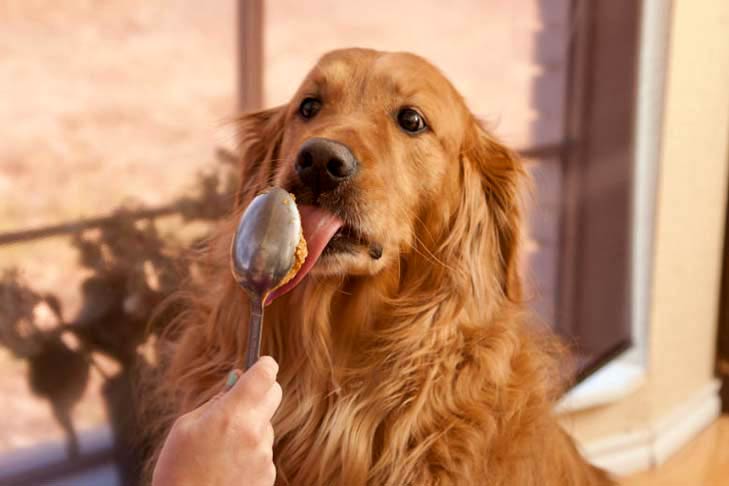Yes, dogs can eat peanuts, but there are some important considerations to keep in mind. Peanuts are generally safe for dogs when given in moderation and in the right form. Here are a few points to consider:
- Raw or Unsalted Peanuts: Dogs should only consume plain, unsalted peanuts. Salted or seasoned peanuts can contain excessive amounts of sodium, which can be harmful to dogs and lead to issues like dehydration or electrolyte imbalances. Additionally, flavored peanuts may contain ingredients that are not safe for dogs, such as onion or garlic powder.
- Allergies: Like humans, some dogs can have peanut allergies. If your dog has never had peanuts before, it’s a good idea to introduce them gradually and monitor for any signs of an allergic reaction, such as itching, swelling, or gastrointestinal issues. If you notice any adverse reactions, stop feeding peanuts immediately and consult your veterinarian.
- Choking Hazard: Peanuts can be a choking hazard, especially if they are given to dogs whole. It’s recommended to give your dog peanuts in a form that is appropriate for their size, such as crushed, ground, or in small pieces. Be mindful of the size of the peanuts to prevent choking or obstruction.
- High in Fat: Peanuts are high in fat, so it’s important to give them to your dog in moderation. Excessive fat consumption can lead to weight gain and digestive upset. If your dog has a history of pancreatitis or other dietary sensitivities, it’s best to consult with your veterinarian before introducing peanuts into their diet.
Remember, while peanuts can be a suitable treat for dogs, they should not replace a balanced and complete diet formulated for their specific nutritional needs. If you have any concerns or questions about your dog’s diet or specific dietary restrictions, it’s always best to consult with your veterinarian for personalized advice.
What Happens If a Dog Eats Peanuts?
If a dog eats peanuts, they may experience an allergic reaction. Symptoms of an allergic reaction in a dog can include: vomiting, diarrhea, trouble breathing, hives, and swelling of the face, lips or tongue.
If your dog has eaten peanuts and is displaying any of these symptoms, you should take them to the vet immediately. Peanut allergies are serious and can be life-threatening.
Why Can Dogs Have Peanut Butter But Not Peanuts?
Dogs can have peanut butter in moderation because it is typically made from roasted and ground peanuts, and certain brands of peanut butter are specifically formulated for dogs. The process of roasting and grinding the peanuts can make them easier to digest for dogs compared to raw peanuts.
Additionally, commercial peanut butter for dogs often does not contain added salt, sugar, or other potentially harmful ingredients found in some human peanut butters. Here are a few reasons why peanut butter may be more suitable for dogs compared to whole peanuts:
- Texture and Consistency: Peanut butter is smooth and spreadable, making it easier for dogs to consume and digest. Whole peanuts, on the other hand, can be hard and potentially pose a choking hazard.
- Allergy Considerations: While some dogs can have allergies to peanuts, the prevalence of peanut allergies in dogs is relatively low. Additionally, peanut butter made specifically for dogs may use roasted peanuts that have lower allergenic potential.
- Controlled Portion Size: When giving peanut butter to dogs, it’s typically in controlled portion sizes and as an occasional treat. This helps prevent excessive fat intake and potential digestive issues.
It’s important to note that not all peanut butter is safe for dogs. Some peanut butter brands contain additives like xylitol, a sweetener that is toxic to dogs. Always check the ingredients and avoid any peanut butter products that contain xylitol or other harmful additives.
As with any new food, it’s recommended to introduce peanut butter to your dog gradually and monitor for any adverse reactions. If you have any concerns or questions about feeding peanut butter or any other specific foods to your dog, it’s best to consult with your veterinarian for personalized advice.
How Many Peanuts Can a Dog Eat?
Dogs can safely eat peanuts, as long as they are unsalted and unroasted. Peanuts are a good source of protein for dogs and contain essential vitamins and minerals.
However, because they are high in fat, dogs should only eat a small number of peanuts at a time. Too many peanuts can cause gastrointestinal upset or pancreatitis in dogs.

Credit: www.akc.org
Can Dogs Eat Peanut Butter?
Most dogs love peanut butter, and it can be a healthy treat in moderation. Peanut butter is high in fat and calories, so it’s not something you want to give your dog too much of.
It’s also important to make sure the peanut butter you give your dog doesn’t contain xylitol, which is poisonous to dogs. When giving your dog peanut butter, always supervise them to make sure they don’t eat too much.
What to Do If My Dog Eats Peanuts?
If your dog eats peanuts, the first thing you should do is call your veterinarian. Peanuts can be toxic to dogs and can cause an allergic reaction.
Your vet will be able to determine if your dog is allergic to peanuts and if they need to be treated. If your dog does not have an allergy, then you will likely just need to monitor them for any gastrointestinal issues.
Conclusion
The quick answer is yes, dogs can eat peanuts. Peanuts are a good source of protein and essential nutrients for dogs. However, there are a few things to keep in mind when feeding peanuts to your dog.
Peanuts contain high levels of fat and calories, so they should be given in moderation. In addition, some dogs may be allergic to peanuts, so it’s always best to check with your vet before feeding them to your pup.